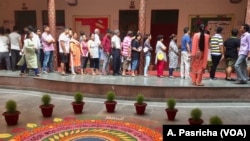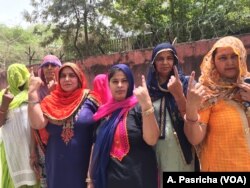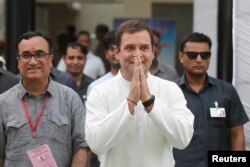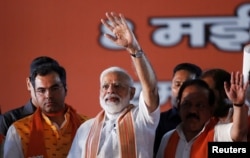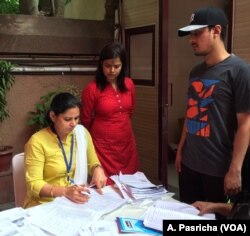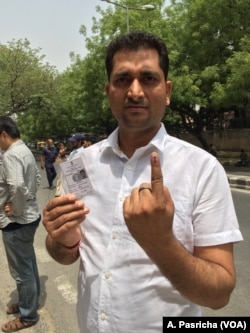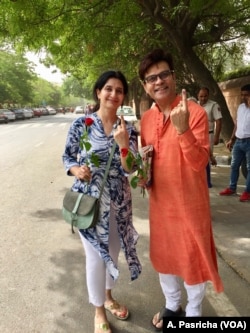Undeterred by the soaring summer temperatures across the plains of India, millions of voters lined up in seven states on Sunday to cast ballots in an election that has turned increasingly bitter as the race appears to be getting tighter.
The second to last round of voting completes polling for 483 out of the 543 seats elected of parliament.
Among those who cast their vote Sunday was the head of the opposition Congress Party, Rahul Gandhi. He has been leading an aggressive campaign against Prime Minister Narendra Modi, hoping to improve his party’s tally from the all time low it hit in 2014 and emerge as a credible challenger to the Indian leader.
Modi has campaigned on a plank of nationalism saying only a strong government led by his Hindu nationalist Bharatiya Janata Party (BJP) can defend the country, but his opponents accuse him of sidelining major issues that confront the country.
Citing distress in the countryside and unemployment as main issues after emerging from a polling booth, Gandhi said that “It was a good fight. Narendra Modi used hatred, we used love. And I think love is going to win.”
Gandhi’s remark comes in the wake of sharp personal attacks that have resonated across campaign rallies in the run up to the last leg of polling.
In the past week, Modi has called Rahul Gandhi’s father, former Prime Minister Rajiv Gandhi “corrupt number one” in a reference to the purchase of artillery guns from Sweden in which he allegedly got kickbacks. The allegations were never proven but dominated political discourse in India during the 1990's as they turned the spotlight on high level corruption in defense deals.
The BJP said Modi’s remarks were made in retaliation to Rahul Gandhi, who has been saying “the watchman is a thief” during his campaign speeches. Gandhi alleges that Modi, who calls himself the country’s “watchman” helped an industrialist make money in the purchase of 36 French fighter jets.
Political analysts and newspaper editorials have slammed the personal barbs saying that the political discourse has hit a new low. “Both sides have reached acute polarization, this has become a kind of Games of Thrones confrontation, where it has become a matter of life and death really and that is really worrying,” says Ajoy Bose, an independent political commentator.
In Sunday’s round much attention was focused on the seven prestigious parliamentary seats in New Delhi, where the ruling Bharatiya Janata Party, the rival Congress Party and a small party are locked in an acrimonious fight. The BJP swept all seats in 2014 as it rode a populist wave but a year later, the Aam Aadmi Party won control of the local Delhi government.
At polling booths across the city, voices are sharply divided, with many rooting to give Prime Minister Modi a second term in office and others expressing frustration that the heated election campaign has failed to focus on bread and butter issues that matter to them.
“At least Modi has done something which can be seen on the ground. It will give further direction [to the country] for the next decade,” says K.S. Murthy, a resident of Delhi.
Dismissing criticism that Modi did not deliver on the development agenda on which he won a resounding victory in 2014, a doctor, Sangeeta, who uses only one name says, “They worked only five years. If we will give further time to the government, they will do much better.”
But for some others, the appeal of Modi, has dimmed. “He promised jobs to the young, but unemployment is growing. That is what we all want, jobs,” says Santosh Kumar Jha, a research scholar in Delhi.
Another resident is disillusioned with the big political players but says the Aam Aadmi party has brought development to low income areas. “They have built roads, improved schools,” says Shahnawaz Khan who works as a driver.
Opinion polls have said Modi’s party will win the most seats in parliament, but is unlikely to get the clear majority it secured five years ago as it is hurt by issues such as rising unemployment and falling incomes in the countryside.
Exit polls can only be published after the last round of polling that will be held on May 19.
But an array of regional parties, who say Modi is losing ground, have begun holding consultations in hopes of coming together to form an alliance to challenge him if his BJP fails to win a majority.
Modi however exudes confidence about retaining his grip on power. Saying that his government has brought development such as roads and electricity to villages and given benefits to farmers, he told a reporter on Friday, “The BJP will win more seats than last time, we will form a government with a clear majority and expand our presence in the country.”
The final verdict will come on May 23 when votes are counted after polls concludes on May 19.




